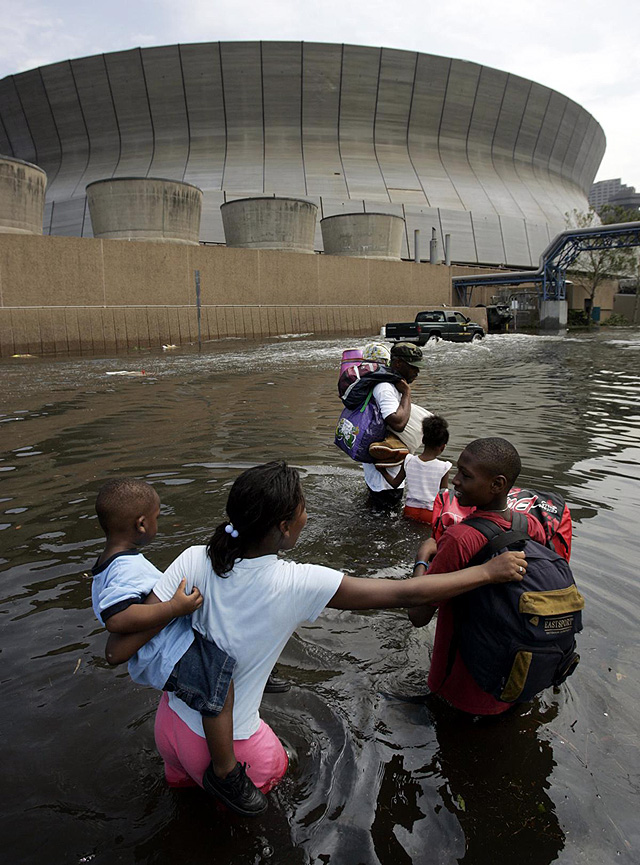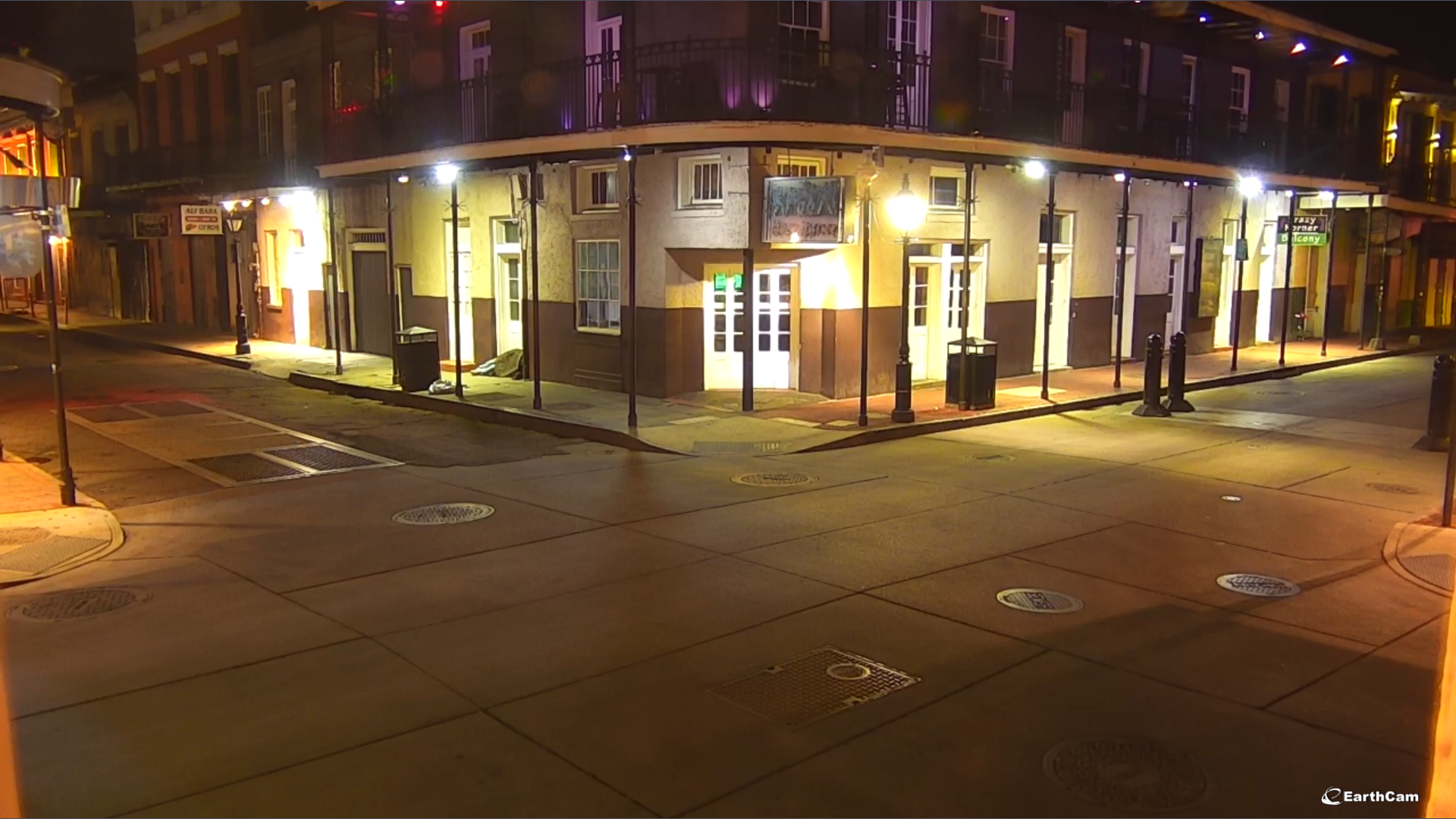 Home Page
Home Page
Katrina
Required
- Morris. "F**k
You, You F**king F**ks."
- Smith. "Oh Beautiful Storm."
- Quess? "Education."
- Kane. "First
Re-entry, Post-Katrina"
- Gypsy. "Summer of Love VII."
- Recknagel. "Between Two Storms."
- Folse. "Carry Me Home."
- Louisiana Anthology Podcast 61. Gian Smith. (The beginning of the interview discusses the poem).
- Louisiana Anthology Podcast 130. Quess.
- Louisiana Anthology Podcast 76. LA Poet Laureatte Julie Kane.


How do we deal with a common loss? Often we have to grieve a
personal loss, usually with other friends and family members who
share the loss. But sometimes we have to deal with a corporate
loss. Katrina took out most of New Orleans and large parts of
the Gulf Coast. What today's reading has in common is the
various ways our authors tried to cope with the loss experienced
in Katrina. All of them reflect the great pain of the loss.
There is a lot of anger as well. Anger over the past failures
that led to the flood, and rage over the failure of government
and the betrayal of New Orleans by much of the nation. Ashey
Morris' blog post on November 27, 2005, is a primal scream of
rage at the botched preparations and corrupt response. This blog
post eventually made it into the premiere of Treme,
which is my candidate for best television series ever. John
Goodman (playing Tulane English professor Creighton Bernette)
voices Morris' words and sets up one of the themes of the show.
The black writers in today's reading also express anger over
the racism that made Katrina so much more difficult for their
community. Algiers police prevented black people from evacuating
New Orleans across the GNO bridge. Other police killed black
citizens. In a reprise of historic white violence, white
vigilantes roamed the city gunning down down black people
with impunity. And while city, state, and federal governments
collapsed for days in their lack of response to the hurricane,
the only institution keeping people alive at the Super Dome were
local gangs. And the national media duly reported that black
people were behaving like animals. The Bush administration
bulldozed undamaged public housing to prevent black families
from returning while openly talking about making the city
whiter. And of course, every teacher in the parish was fired,
most of them black.
As I'm writing this lecture on April 25, 2020, Bourbon Street
is once again deserted, as are the streets of the rest of New
Orleans. The death toll in New Orleans during Katrina was 1,836.
The death toll in New Orleans as of tonight is 399. Tomorrow it
will be higher. By the time you read this, it will be higher
still. It's very likely to surpass the Katrina death toll over
time. Both events are rooted in natural disasters of storm and
disease, but both were magnified by our own social, economic,
and political disfuctions. We are in the 40th year of the Reagan
Revolution, which sees the federal government as the problem and
dissolving it as the solution. And when the heirs of Reagan get
into office promising to push that revolution forward, it's not
a big surprise when they don't respond to crises effectively,
from the perspective of the people going through it.
Of course, their response is successful from
their own perspective. Disaster capitalism is the branch of
capitalism that takes advantage of disasters. Thus after
Katrina, Charity Hospital (which was almost 300 years old) was
closed down. So was the public school system of New Orleans. Now
it's a patchwork of charter, private, and parochial schools.
Quess's poem "Education" is a protest against the destruction of
the public school system of New Orleans. He points out that
after all the black, middle-class teacher of New Orleans were
fired, human trafficking was used to bring in teachers from the
Philippines. The goal of disaster capitalism is to pick the
bones of society clean. So close a school, give the building to
a private corporation, let them run a charter school until it
fails, then strip the building, sell the copper, and sell the
land to a McDonalds. Meanwhile, fire the local teachers who look
like the students and are from their community, who buy houses
and attend church and otherwise build up their neighborhood. And
hire bungee teachers to come in for a couple of years from
somewhere else, work for half the former teacher salary, then
exit the community to return home. Close the 300-year-old
Charity Hospital, and 15 years later, black people in New
Orleans who get corona are twice as likely to die as white
people. And of course, the closing of Charity Hospital is just
the tip of the iceberg when it comes to discrepencies in the
health of poor people vs rich people, black vs white, etc.
Julie Kane's poems are sonnets recounting her response to the
shock of the initial devestation. One compares the city to a
cancer patient who is visibly declining. The other talks about
how she has become one of those people who talk about what
they've lost as the city changes over time.
Gian Smith writes in the Whitman style. According to Smith, the
poem began to come to him while he was scrubbing mud in his
mother's house. He ironically calls the storm 'beautiful,' even
as he recounts the terrible consequenses of the storm for
himself and his city. Gypsy (Kristina Robinson) writes a hip-hop
inflected essay 6 years after Katrina reflecting back on the
early days after she returned to New Orleans, when the stress of
Katrina had made her lose weight to the point she was mistaken
for a crack addict, while tanks rolled through the city.
Recknagel's writes an autobiographical essay relating New
Orleans to her personal life. New Orleans is like a giant
magnet, and as magnets do, it attracts or repels you based on
your own polarity. It attracted Recknagel. Her home town of
Shreveport was the spiritual as well as geographical antipode of
New Orleans. As a young girl who wanted to be a hippy, walk
around town barefoot, drink strong coffee, and date black men,
New Orleans was more of a home to her than Shreveport could ever
be. And then Katrina hit, and her old lover showed up on her
doorstep in Houston to stay for a while. She weaves back and
forth from past to present throughout the essay.
Mark Folse had been living in North Dakota when Katrina hit.
Part of his response to the grief was to go to a local
fund-raising concert by a group of musicians from New Orleans.
Hearing "Do You Know What It Means to Miss New Orleans?" while
he and the musicians wept, he knew he had to go home. And
talking to non-New-Orleanian his wife later, she said she knew
then also. The magnetic power of New Orleans is felt through its
music as much as anything.